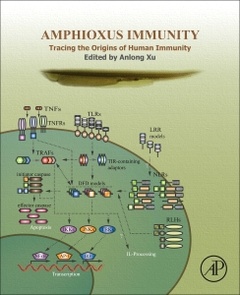Amphioxus Immunity Tracing the Origins of Human Immunity
Coordonnateur : Xu An-Long

Amphioxus Immunity: Tracing the Origin of Human Immunity covers a remarkable range of information about Amphioxus and its evolutionary context. This compilation of what is currently known about Amphioxus, with a sharp focus on its immune system, includes 13 topics, such as:
- Amphioxus as a model for understanding the evolution of vertebrates
- basic knowledge of immunology
- immune organs and cells of amphioxus
- a genomic and transcriptomic view of the Amphioxus immunity
- pattern recognition system in Amphioxus
- transcription factors in Amphioxus
- the complement system of Amphioxus
- the oxidative burst system in Amphioxus
- immune effectors in Amphioxus
- lipid signaling of immune response in Amphioxus
- apoptosis in amphioxus; primitive adaptive immune system of Amphioxus
- and future research directions
This valuable reference book is loaded with information that will be useful for anyone who wishes to learn more about the origin of vertebrates and adaptive immunity.
2 Basic knowledge of immunology
3 Immune organs and cells of amphioxus
4 Genomic and transcriptomic view of the amphioxus immunity
5 Pattern recognition system in amphioxus
6 Transcription factors in amphioxus
7 The complement system of amphioxus
8 The oxidative burst system in amphioxus
9 Immune effectors in amphioxus
10 Lipid signalling of immune response in amphioxus
11 Apoptosis in amphioxus
12 Primitive adaptive immune system of amphioxus
13 Future research directions
biologists, immunologists, developmental biologists, and scientists of evolutionary biology, marine biology, and medicine.
Professor, College of Life Sciences, Sun Yat-sen University; President, Beijing University of Chinese Medicine
Anlong Xu was awarded a government scholarship to study in the United States after his B.S. degree from Sun Yat-sen University in 1985. He went to the University of Illinois at Urbana-Champaign (UIUC) in Sep 1986 to pursue his graduate study in immunogenetics under Dr. Harris Lewin’s supervision and obtained his Ph.D. from UIUC in 1992. Dr. Xu then did his postdoctoral research in Dr. Helen M. Ranney’s lab at the University of California, San Diego for 2 years. Dr. Xu joined a San Diego-based Alliance Pharmaceutical Corp from 1994-1996 and worked on new drug discovery. After 10 years of study and research work in the U.S., he joined the faculty of Department of Biochemistry at College of Life Sciences, Sun Yat-sen University, his alma mater, in 1996.
Dr. Xu currently is a professor in molecular biology and immunology, Director of National Engineering Center for Marine Biotechnology of South China Sea. Dr. Xu was appointed to Vice-President for research and development of Sun Yat-sen University in 2008 after serving as Dean of the College of Life Sciences for 9 years. He was promoted as President of Beijing University of Chinese Medicine in 2013. Dr. Xu has published more than 100 papers in peer-reviewed international journals, such as N. Engl J Med, Sci Signal, Genome Res, Am J Hum Genet, and J Immunol. Dr. Xu is currently President of Guangdong Society of Biochemistry and Molecular Biology and Vice-President of International Society for Developmental and Comparative Immunology. He currently serves on the Editorial Board for the following international journals: Annual Review of Animal Bioscience, BMC Genomics, and Animal Biotechnology.
At the end of last century, Dr. Xu started his study on the origin and evolution of human immunity using Amphioxus as a model organism. His lab is now one of the pioneer labs in the world to study amphi
- Provides new evidence on the origin of the adaptive immune system, the evolution of innate immunity, and evolution-stage specific immune defense mechanisms
- Not only presents the cells and molecules involved in the adaptive immune response in Amphioxus, but also characterizes the origination and evolution of the gene families and pathways involved in innate immunity
- Includes much pioneering work, from the molecular, genomic, and cellular to the individual level
Date de parution : 12-2015
Ouvrage de 304 p.
19x23.3 cm
Thème d’Amphioxus Immunity :
Mots-clés :
adaptive immunity; alternative 3' UTR; alternative pathway; amebocytes; amphioxus; antiviral; antiviral response; Apaf-1; apextrin-like proteins; apoptosis; arachidonic acid; ASC; bactericidal/permeability-increasing protein; bbeSTATa; bbeSTATb; bbtA20; bbtIRF1; bbtIRF3; bbtIRF7; bbtMyD88; bbtp105; bbtRel; bbtRIP1; bbtTICAM; bbtTRAF; Bcl2; C-type lectins; chitin-binding proteins; classical pathway; complement; complement system; COX; CYP; DBD; DFD; DNA sensor; domain shuffling; DR; Drosophila; eicosanoid; evolution; expansion; galectin; gene duplication; gene regulation; genome; gram-negative bacteria-binding proteins; IκB; IFN; immune effector; immune-related gene family; immunity; innate immunity; intelectin; JAK; lancelet; lectin pathway; living fossil; LOX; lymphocytes; lymphoid cells; lysozymes; MHC; microRNA; molecular evolution; NACHT; NF-κB; NLR; oxidase; oxidative burst; p58; pattern recognition; peptidoglycan recognition proteins; phagocytic respiratory burst; phagocytosis; phylogenetic; primary lymphoid organs; protochordate; RAG; RHD; RLR; RNAi; tachylectin-related homolog; TCR; TLR; TRAIL; transcriptome; transferrin; Tung Tichou; ubiquitination; Wenchang fish



